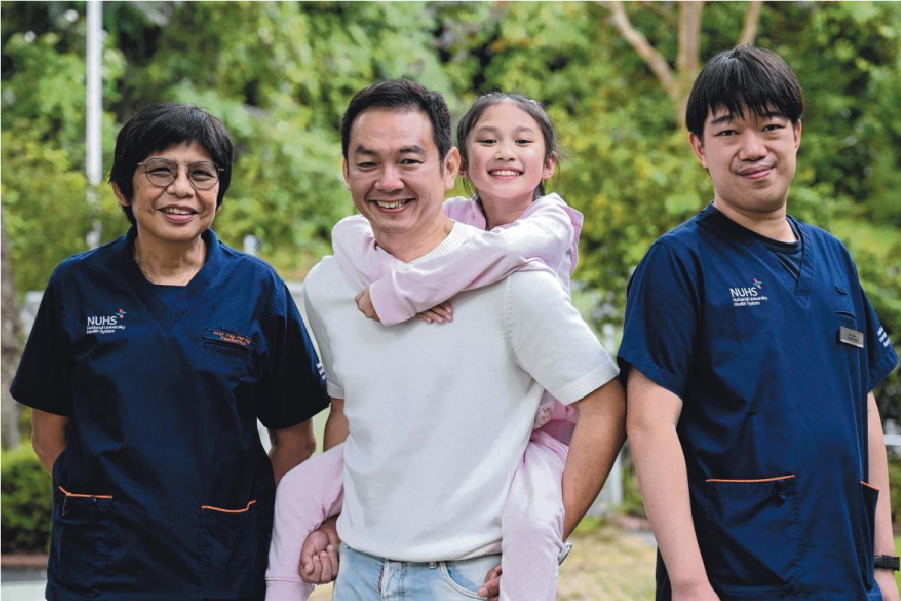NUH doctors diagnose and manage atypical haemolytic uremic syndrome
in young Huang Siqing, enabling her to enjoy a fulfilling and vibrant childhood.
Issue 4 | March 2024

 Subscribe and ensure you don't miss the next issue!
Subscribe and ensure you don't miss the next issue!
Affecting fewer than two in every million people globally, atypical haemolytic uremic syndrome (aHUS) is an exceptionally rare medical condition. Hallmarks of the disease include haemolytic anaemia, where red blood cells are prematurely destroyed, thrombocytopenia, which denotes a low platelet count, and acute kidney failure.
The disease is also often difficult to diagnose. In April 2017, this medical complexity took then-four-year-old Huang Siqing and her family on a roller coaster ride of emotions. She developed symptoms of aHUS, which initially perplexed the family but was eventually—and promptly—unravelled thanks to the expertise of the National University Hospital (NUH) doctors. The timely diagnosis was pivotal in ensuring that she received the appropriate treatments, averting the risk of severe and potentially lifelong health issues.
Uncovering a rare disease swiftly
“I’ve encountered aHUS just once in a Singaporean in my experience, the rest being patients from the region” recounts Professor Yap Hui Kim, Head and Emeritus Consultant in the Division of Paediatric Nephrology, Dialysis and Renal Transplantation, Department of Paediatrics, Khoo Teck Puat – National University Children’s Medical Institute, NUH. “It causes tiny blood clots to form in the small blood vessels of the body and without prompt intervention, these clots can block blood flow to critical organs such as the kidneys, causing significant damage and potentially leading to kidney failure.”
By the time Siqing arrived at NUH, her condition, marked by symptoms including swollen feet, a facial rash and decreased urine output, demanded urgent attention. A team of doctors including Prof Yap, combed through her medical history, conducted extensive blood tests and ultimately identified aHUS as the culprit behind her discomfort. The team immediately devised a multifaceted treatment strategy, initially employing plasmapheresis to manage her condition.
Plasmapheresis involves the replacement of Siqing’s blood plasma with healthy plasma from the blood bank. “The procedure targets the abnormal activation of the complement system, a component of the immune system that, when overactivated, leads to the inflammation and clot formation in the kidneys’ blood vessels,” explains Dr David Lu, Associate Consultant in the same division. “By removing the proteins and factors causing this overactivation, plasmapheresis effectively mitigated further kidney damage and improved Siqing’s overall condition.”
The positive impact of plasma transfusions on Siqing’s platelet count, along with a kidney biopsy confirming the presence of blood clots, reinforced the diagnosis of aHUS. “We then introduced eculizumab, an injectable medication offering a quicker and more efficient method of treatment compared to plasmapheresis,” adds Dr Lu. “It directly inhibits the abnormal activation of the complement system.”
Healing hands restore normalcy
The NUH team’s judicious treatment plan for Siqing—initially comprising weekly injections, later adjusted to biweekly, and finally monthly—facilitated her recovery. By May 2017 she was ready for discharge, having received between eight and 10 injections in total, with her treatment concluding in January 2018.
While maintaining an optimistic outlook, the medical team underscored the importance of vigilance against the potential recurrence of aHUS. Now ten years old, Siqing leads a fulfilling life. Since her discharge, tests have reassuringly shown no signs of relapse. Regular check-ups to monitor her kidney function and platelet count have become part of her new normal, safeguarding her health.
Prof Yap highlights the necessity of proactive kidney care to forestall long-term health complications. “Maintaining a healthy lifestyle, including proper hydration, a balanced diet with exercise and abstaining from smoking, is essential, as these measures minimise the risk of future renal issues, potentially obviating the need for dialysis in Siqing’s later years,” says Prof Yap.
Like this article? Simply subscribe to make sure you don't miss the next issue of EnvisioningHealth!

















